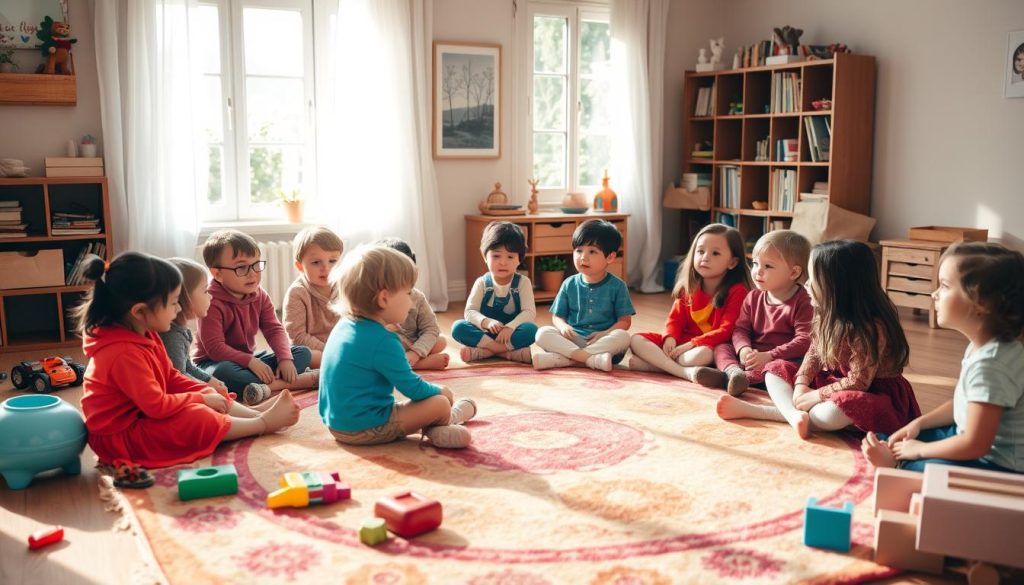Reconnecting with your biological parents is a journey filled with emotions and practical steps. It’s about understanding your adoption or foster care background. Finding your birth parents involves many personal steps.
First, grasp the complexities of adoption and foster care. Your background shapes who you are. Understanding it can bring clarity and identity.
Many people are curious and unsure about their origins. They wonder about their adoption circumstances.
Before reconnecting, prepare well. Think about your goals and what you want to achieve. Use resources like adoption agencies and online platforms to help your search.
When you’re ready to contact your biological parents, plan carefully. Choose a communication method that feels right for you. Be ready for different reactions from your birth parents.
Having a strong support system is crucial. Friends, family, or professionals can offer emotional support. Good communication with your biological parents means listening and showing empathy.
Dealing with mixed emotions is part of the journey. Joy and disappointment are both normal. Embracing your journey and setting boundaries are important.
Legal aspects are also key. Knowing adoption laws and rights can help. Sometimes, legal advice is needed to ensure everything is done right.
Celebrate your journey. Acknowledge your strength and the connections you’ve made. Cherish these moments.
Key Takeaways
- Understanding the adoption process and foster care dynamics can provide clarity and a sense of identity.
- Preparation and self-reflection are essential steps before attempting any reconnection with birth parents.
- Building a support system through friends, family, or professionals can help navigate this emotional journey.
- Effective communication and empathy play crucial roles in fostering a positive relationship with biological parents.
- Be aware of legal considerations and seek advice to ensure everything is handled correctly.
- Embrace mixed emotions and acknowledge your resilience throughout the process of reconnecting with your biological parents.
- Set clear boundaries to respect everyone’s privacy and define the nature of your relationship with birth parents.
Understanding Adoption and Foster Care Dynamics
The foster care system and adoption are complex. They deeply affect many children and families. Knowing the basics is the first step to understanding these systems.
The Importance of Knowing Your Background
Knowing your background is key to understanding yourself. Adoptees can better handle their feelings by learning about their roots. This helps them feel secure and complete.
Many people in foster care or adoption wonder about their birth families. They might feel a strong need to know about their past. This curiosity is important for their mental health.
Navigating Feelings of Curiosity and Uncertainty
Curiosity and uncertainty are common in foster care. Adoptees and foster children often wonder about their birth families. They might ask why they were placed in foster care or adopted.
Adoption experts say openness in adoption helps with self-esteem. It helps connect adoptees with both their birth and adoptive families. For example, in cities, adoptions, especially for African-American kids in kinship homes, are increasing. This is despite the adoption process being slower for some groups.
The table below shows important data about foster care and adoption:
| Foster Care and Adoption Dynamics | Data Highlights |
|---|---|
| Foster Care Utilization | Differs between large urban areas and smaller/non-urban areas |
| Adoption Assistance | Projected to exceed foster care from 2004 to 2006 |
| Demographic Trends | Increased adoptions among urban, African-American, and kinship home children |
| Foster Care Objectives | Temporary arrangement focusing on safety, reunification, or long-term solutions |
| Challenges and Rewards | Includes emotional demands but offers personal growth and positive impacts |
Preparing for Reconnection
Starting to reconnect with your biological parents needs careful planning. Knowing why you want to reconnect and gathering important details are key steps. This foundation will help guide your search.

Reflecting on Your Goals and Intentions
Before reaching out, think deeply about your goals. Ask yourself why you want to reconnect. Is it for closure, to learn about your medical history, or to build a relationship?
Talking about adoption with your children is also important. Be ready for a mix of emotions, including curiosity and uncertainty. Foster parents can offer valuable insights into your past.
Gathering Relevant Information
Start by looking at adoption papers and talking to your adoptive parents. Also, check government records. Knowing if you have siblings is especially important.
There are many resources available, like support groups for foster parents. They can provide advice and help find records or contacts. Case plans from caseworkers and guardians can also offer guidance.
Here are some tips to help you prepare:
- Learn about your cultural, racial, and ethnic background from care documents.
- Think about the distance between potential family members and your current location.
- Reflect on past family time to understand possible reactions.
Getting ready involves using both past documents and personal experiences. This way, you’ll be informed and emotionally ready for your search.
Here’s a quick overview of what affects fostering and reconnecting:
| Factors | Impact |
|---|---|
| Reunification with Birth Family | Most foster children are reunited, which may include continued contact with foster parents. |
| Unanswered Questions | Children often have questions about their past, which can drive their desire to reconnect. |
| Case Plans | These plans are crucial for understanding your background and making successful connections. |
| Virtual Family Time | Can be part of case plans, helping keep connections alive even when meeting in person is hard. |
| Preparation Needs | Families and children need preparation to reduce trauma and increase positive change. |
Searching for Biological Parents
Starting your journey to find your biological parents is a deep and meaningful step. It needs careful planning and thought. Today, many tools and strategies help make this process easier than before.
Utilizing Adoption Agencies for Support
The top adoption agencies provide key help in finding your biological parents. They give access to information that doesn’t reveal your identity. They can also help set up meetings in some cases.
In the U.S., adoptees over 18 can usually get this information. Some states require you to be 21.
Adoption reunions are encouraged by many states. They use registries like the International Soundex Reunion Registry (ISRR). These registries let adoptees and biological parents share information if they want to. They aim to bring families together while respecting privacy.
Exploring Online Resources and Social Media
The digital world has changed how we find biological parents. Services like AncestryDNA and 23andMe are now key tools. They match your DNA with possible relatives, giving you important clues.
Social media, especially Facebook, is also a big help. It connects adoptees with their birth families. Online groups for adoption searches offer support and shared experiences, creating a community for those searching.
Before, finding biological parents meant digging through old records and libraries. Now, with a few clicks, you can find a lot of information and connect with people who can help.
Initiating Contact
Starting to talk to your biological parents is a big step. There are many ways to communicate in adoption. Picking the right one can help build a strong and meaningful bond.
Choosing the Right Method of Communication
Choosing how to communicate in adoption depends on your comfort and what your birth parents might think. You can use digital platforms, go through someone else, or write letters. The most important thing is to be respectful and thoughtful in your approach.
- Digital Platforms: Social media is a fast and easy way to start. Sites like Facebook or LinkedIn can help you begin a conversation in a casual setting.
- Intermediaries: Adoption agencies or mediators can help you first meet. They make sure both sides are ready for the talk.
- Letters: Writing to your birth parents is a personal and classic choice. It lets you share your thoughts and feelings carefully.
Journaling is common among foster parents. It’s a good way to start talking to biological parents. Foster parents learn a lot about the kids through letters, which helps everyone.

Writing a Thoughtful Letter
Writing to your birth parents needs to be both sensitive and clear. Here are some tips:
- Introduce Yourself: Start with your name, birthdate, and how to reach you.
- Express Your Intentions: Say you want to reconnect and learn about your past.
- Be Respectful: Understand the situation’s complexity and respect their privacy and feelings.
- Ask Questions: Ask about their preferences, routines, and history to open up the conversation.
- Share Encouragement: Showing support can help build a positive relationship and aid in reunification.
Sharing updates, photos, and important info with biological parents is key. Being encouraging can really help. Also, including details for visits can make reunification smoother.
In New Jersey, foster parents often have little contact with biological parents. But, those who do find it valuable. It helps gather information about the child’s story and health. This cooperation makes reunification easier for everyone.
Managing Expectations
When you reconnect with your biological parents, it’s key to manage your adoption expectations. Knowing that outcomes can vary and be unexpected helps you handle the journey with grace and resilience.
Understanding Potential Outcomes
The emotional impact of fostering and adoption can shape potential outcomes. Adoptees may face a range of reactions, from warm welcomes to indifference or rejection. It’s important to remember that each biological parent’s response is influenced by their own experiences and circumstances.
Adoptive parents may experience disappointment in their children, similarly to all parents. Loss of the idealized child can be a problem for all parents if it is not recognized.
Parents may struggle with unconditional love, especially with adoption. It brings unique challenges related to ambivalence and societal expectations. School-age adopted children often test boundaries as they try to understand their adoption story.
Talking about the challenges of adoptive parenting with a supportive group can be helpful. This shared understanding helps in accepting and addressing the emotions tied to reconnecting with biological families.
Preparing for Different Reactions
Understanding the emotional impact of fostering is crucial when preparing for different reactions. Foster children often face trauma, leading to varied emotional and behavioral responses when meeting biological parents.
Research shows that foster parenting classes can better equip caregivers to handle trauma and mental health challenges. Building trust and establishing bonds with foster children is essential but can be challenging. Expect emotional ups and downs, and be prepared for a range of responses from biological family members.
A parent’s social network provides crucial support for navigating these complexities. Foster parenting is transformative, requiring adaptability, understanding, and the realization that mistakes are part of the learning process.
| Expectations | Adoption | Fostering |
|---|---|---|
| Potential Outcomes | Varies widely; may face ambivalence or warmth | Likely to experience trauma; varied emotional responses |
| Support Systems | Beneficial to express ambivalence to a supportive group | Crucial; social network aids in managing challenges |
| Parenting Classes | Helpful for managing adoption expectations | Essential for handling trauma and establishing bonds |
Foster parents play a critical role in supporting children recovering from abuse, neglect, or family challenges. They provide essential care, education, and medical support to ensure children thrive despite their past traumas.
Building a Support System
Starting to reconnect with your biological parents can be very emotional and tough. Having a strong support system is key. It helps both adoptees and their families do well during this time.
Finding Trusted Friends and Family Members
Finding friends and family who support you is a big first step. They can help you feel less alone and less anxious. It’s important to choose people who get your journey and want to help you succeed.
They can listen, give advice, and offer moral support. These things are very helpful when you’re feeling down.
Seeking Professional Guidance

Getting help from professionals is also very important. Counselors and therapists who know about adoption can offer great advice and therapy. They can help you deal with hard feelings and challenges.
In the U.S., about 391,098 kids live in foster care, and 117,000 are waiting to be adopted (Statista, 2023). Kids in foster care often face big mental health issues. They might feel sad or anxious a lot more than other kids.
Having strong support systems in adoption helps you deal with the emotional ups and downs of the journey.
Getting professional help means you get support that is caring, informed, and structured. This helps you and sets a good example for your family’s future. Whether it’s therapy, support groups, or counseling, it makes the journey easier and more meaningful.
In short, having a strong support system is crucial for a good reconnection journey. It includes friends, family, and professional help. Remember, you’re not alone, and asking for help can really improve your emotional health and the outcome of your journey.
Communicating Effectively
Effective communication is key to strong relationships, especially in adoption. It involves active listening, empathy, and overcoming barriers. This section will guide you on how to improve interactions and understanding between adoptees and their biological families.
Active Listening and Empathy
Active listening means more than just hearing words. It’s about fully engaging with the speaker, understanding their feelings, and responding well. In adoption, it makes conversations better and reduces misunderstandings.
Studies show active listening makes communication more efficient. For adoptees reconnecting with their biological families, empathy and gratitude are crucial. Empathy helps understand the other person’s view, building a positive relationship.
Overcoming Communication Barriers
Breaking down barriers in adoption communication is vital for success. These barriers can include emotional issues, cultural differences, or past traumas. Using positive language and showing respect can help ease tensions and build trust.
Handling tough moments calmly is also important. For example, taking time-outs can help both sides. Making sure everyone feels valued and understood makes the experience better.
In fostering, similar strategies are used. Foster parents should slow down and let children express themselves fully. Valuing their thoughts and opinions builds respect. Feedback from fostering programs shows the hard work of agency staff, improving communication.
“Effective communication leads to a reduction in misunderstandings, resulting in smoother experiences and stronger relationships within the adoption process.”
Handling Mixed Emotions
Starting your emotional journey in adoption can be both thrilling and tough. You’ll feel many emotions when reconnecting with your biological parents. It’s key to understand and manage these feelings for your well-being.
Coping with Joy and Disappointment
Reconnecting might bring you great joy, but it can also lead to disappointment. It’s vital to find ways to deal with these ups and downs. Here are some helpful strategies:
- Recognize and accept your feelings: It’s normal to have mixed emotions. Don’t hide them.
- Create a support network: Be around people who get what you’re going through.
- Seek professional help: A counselor can offer advice on handling tough emotions.
Embracing the Journey
Embracing your emotional journey in adoption means accepting it’s complex and ongoing. Every experience, good or bad, moves you forward. Here’s how to embrace it:
- Maintain open communication: Talk about your feelings with people you trust.
- Stay patient: Building relationships takes time. Be patient with yourself and others.
- Celebrate small victories: Every positive moment is worth celebrating.
By using these coping strategies, you can handle the emotional ups and downs. This way, you can fully enjoy the journey ahead.
Setting Boundaries
In the journey of reconnecting with biological parents, setting boundaries is key. Good boundaries help manage expectations and make the reconnection healthier. They ensure everyone’s needs and privacy are respected.
Respecting Privacy for Everyone Involved
Setting boundaries in adoption means addressing privacy concerns. It’s important to respect the privacy of all parties involved. This includes not sharing too much personal information and protecting mental and emotional well-being.
In foster care, where 437,500 children were in care in 2021, privacy is even more crucial. Foster care reunification rates are about 50%. Clear boundaries are vital for the child’s well-being and to keep connections meaningful.
Defining Your Relationship Goals
When reconnecting with biological relatives, setting clear goals is essential. You need to talk openly about your intentions and what you expect. This helps everyone know what to expect and how involved they’ll be.
- Emotional boundaries: Set limits on how much you share emotionally, considering everyone’s comfort.
- Physical boundaries: Agree on personal space and how often you’ll see each other.
- Communication boundaries: Decide how often and how you’ll talk, making sure everyone feels respected.
Experts like social workers and therapists can help. They guide you through setting boundaries and keeping the child’s best interests first. Working together with foster and biological parents is also key. Clear boundaries and respecting each other’s roles help prevent misunderstandings and build healthy relationships.
Respecting privacy and setting boundaries is crucial for everyone’s well-being. It creates a space where reconnecting can be meaningful and lasting. By tackling these issues, you lay a strong foundation for respectful and constructive relationships.
Legal Considerations
Starting to reconnect with your biological parents requires knowing the adoption legal process and rights. Learning about these ensures your journey is legal and smooth. This avoids any problems along the way.
Understanding Adoption Laws and Rights
The Adoption and Safe Families Act (ASFA) of 1997 changed foster care policies. It focuses on keeping children safe and happy. Knowing these laws helps you understand the adoption process better.
ASFA aims to get kids out of foster care faster. It wants them in stable homes where they can stay long-term. Foster care adoptions are quicker and cheaper than private ones.
| Aspect | Foster Care Adoption | Private Adoption |
|---|---|---|
| Waiting Period | Shorter | Longer |
| Cost | Lower | Higher |
| Parental Consent | Required for children 12+ | Varies |
| Legal Process Responsibility | County Agency | Adoptive Family |
| Financial Coverage | Public Programs | Adoptive Family |
Seeking Legal Advice
Dealing with adoption laws can be tricky. Getting legal advice is a good idea. A lawyer can explain your rights and help you avoid legal issues.
In the U.S., each state has its own adoption laws. Safe Haven laws help prevent baby abandonment. The Intercountry Adoption Act of 2000 makes the U.S. Department of State the central authority for international adoptions. Knowing these laws protects your rights and those of your biological parents.
Celebrating Your Journey
Reconnecting with your biological parents after adoption or foster care is a deep journey. It’s not just about finding your roots. It’s also about celebrating your strength and growth. The author of this article has moved 23 times and gone to 11 schools, showing great resilience.
By facing these challenges, you show your strength. This is a big part of your journey.
Acknowledging Your Strength and Resilience
You’ve shown incredible strength and resilience. Moving and going to different schools while keeping hope alive is a big deal. It shows your true character.
It’s important to think about these experiences. Celebrate how you’ve adapted and kept going. Many children adopted in the U.S. are adopted by their foster caregivers, showing strong support.
Every step of your journey is special. Whether you’ve found biological relatives or discovered yourself, it’s all part of your unique story.
Making Meaningful Connections
Building and keeping new connections is key in celebrating adoption. Having supportive relationships is crucial. This can be with biological family, mentors, or foster parents.
Statistics show that 34% of children in the U.S. are adopted by relatives. This highlights the role of kinship care in keeping families together. Resources like the Kansas Post Adoption Resource Center offer support for adoptive families.
Adopting within federal timelines helps provide stability and attachment. This is important for children’s growth. Embracing your adoption roots and nurturing these connections can lead to a fulfilling life.
Your journey is about more than finding relatives. It’s about celebrating your strength, resilience, and the connections you’ve made. Embrace your adoption roots, recognize your strength, and look forward to a lifetime of growth and relationships.
FAQ
Why is it important to know your background in the adoption process?
How should I navigate feelings of curiosity and uncertainty when searching for my birth parents?
What are the initial steps to take before seeking out birth parents?
How can adoption agencies assist in finding biological parents?
How has technology transformed the search for biological parents?
What are the best methods for initiating contact with biological parents?
How can I manage expectations when reconnecting with birth parents?
Why is building a support system important during the reconnecting process?
What communication skills are crucial when reconnecting with biological families?
How can adoptees handle mixed emotions during the reconnection process?
What is the significance of setting boundaries in the reconnection process?
What legal considerations should adoptees be aware of during the reconnection process?
How can adoptees celebrate their journey after reconnecting with biological parents?
This post contains affiliate links. If you click on a link and make a purchase, I may earn a small commission — at no extra cost to you. Thank you for supporting this blog and helping me keep the patterns free! Read the full Affiliate Disclosure & Transparency.
